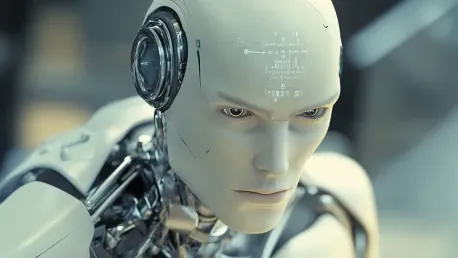The escalating adoption of generative AI (Gen AI) in the workplace presents an opportunity to address significant issues such as cognitive overload and productivity drops among employees. As technology evolves, companies are increasingly incorporating AI into their daily operations. This article delves into the transformative potential of Gen AI and its impact on the modern work environment, highlighting how it can enhance employee interactions and streamline workflows to create a more efficient and satisfying workplace.
The Rapid Rise of Gen AI in the Workplace
The adoption of Gen AI technology in business settings is soaring, with a significant number of MBA and Master in Management students incorporating it into their daily routines. This trend indicates a growing comfort and reliance on AI tools among the future managerial workforce. Moreover, a large percentage of current employees anticipate that AI will substantially impact their job roles within the next few years. The evident increase in reliance on AI constitutes a significant shift in how work is conducted, pushing organizations to focus on optimizing AI integration.
For organizations, the approach to integrating Gen AI is crucial. A hasty or poorly managed AI implementation process could lead to new challenges, adding to the stress and workload of employees rather than alleviating it. Thus, the need for a strategic approach that emphasizes both efficiency and employee well-being is paramount. Organizations must evaluate how AI tools can fit into existing processes without disrupting the flow of work, ensuring that the tools complement rather than complicate employee tasks.
Understanding Cognitive Overload
Modern workers face an issue of cognitive overload due to the constant need to juggle multiple applications and tasks. On average, employees switch between 35 job-critical applications over 1,100 times daily, leading to heightened stress levels and decreased productivity. This continuous task-switching not only hampers employee performance but also impacts overall organizational efficiency. As employees struggle to manage the myriad applications required for their roles, the risk of burnout and decreased job satisfaction increases.
Addressing cognitive overload is therefore a pressing concern for companies aiming to maintain a healthy and productive workforce. The incessant need to navigate various technologies and multitask can lead to mental fatigue, reduced work quality, and increased errors. Organizations must identify the factors contributing to cognitive overload and implement strategies to mitigate its effects. By doing so, they can safeguard employee well-being, enhance productivity, and ultimately improve the company’s performance.
Gen AI’s Role in Reducing Cognitive Overload
Gen AI holds promising potential in alleviating cognitive overload in the workplace by automating repetitive and mundane tasks. By taking over these basic functions, AI allows employees to focus on more complex and meaningful activities. Automating repetitive tasks can also help streamline workflows, enhancing organizational efficiency. The freed-up mental space enables employees to engage in higher-quality work that fosters innovation and creative problem-solving, ultimately contributing to business growth.
Additionally, by reducing the need for constant multitasking, Gen AI can alleviate the mental strain associated with juggling numerous tasks simultaneously. This shift can lead to improved job satisfaction as employees find more time to concentrate on tasks that require their unique skills and expertise. By strategically implementing AI to handle routine and standardized functions, organizations can enhance productivity while ensuring that employees remain engaged and motivated.
Enhancing Emotional Support and Task Orchestration
Another valuable application of Gen AI is its capability to provide real-time emotional support, especially in high-stress roles such as call centers. AI can monitor and detect distress signals during employee interactions, offering timely interventions to mitigate stress. This not only improves employee well-being but can also enhance job satisfaction and retention. AI’s ability to identify and address emotional cues can lead to a more supportive and understanding work environment.
Furthermore, Gen AI can effectively coordinate complex tasks that require inputs from multiple employees or departments. By orchestrating these tasks, AI can simplify processes, reducing the time and effort needed to manage dependencies and streamline communication channels. This orchestration ensures that projects progress smoothly, minimizing delays and promoting collaboration among team members. The result is a more cohesive workflow that enhances overall productivity and job satisfaction.
The Rising Importance of Soft Skills
In a Gen AI-driven workplace, the importance of soft skills such as communication, empathy, teamwork, and problem-solving is magnified. As AI takes over routine tasks, employees will have more time to dedicate to activities that depend on these essential skills. With the reduction in routine tasks, the human aspect of work becomes more pronounced, highlighting the need for strong interpersonal and collaborative abilities.
Organizations must prioritize hiring, training, and promoting individuals with robust soft skill sets to prepare their workforce for an AI-integrated environment. Investing in the development of these skills ensures that employees can successfully navigate the evolving workplace landscape. Moreover, it helps maintain a human touch in business operations, ensuring that the efficiency brought by AI is complemented by human creativity and empathy.
Creating a Human-Centered AI Strategy
The growing use of generative AI (Gen AI) in the workplace represents a significant opportunity to tackle critical issues like cognitive overload and reduced productivity among staff. As technology advances, businesses are increasingly integrating AI into their everyday operations. This article explores the transformative potential of Gen AI and its effects on the modern work environment, emphasizing how it can improve employee interactions and streamline workflows. By doing so, AI fosters a more efficient and fulfilling workplace. Through the use of Gen AI, companies can not only enhance productivity but also address the personal and professional well-being of their workforce, ultimately leading to a more balanced and rewarding work life. The continuous development and implementation of Gen AI tools have the potential to revolutionize traditional workflows and redefine employee engagement, creating a modern work environment where efficiency meets satisfaction.









